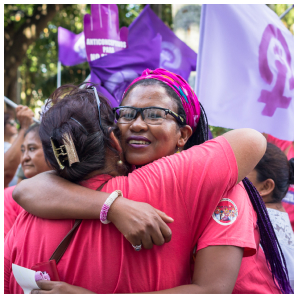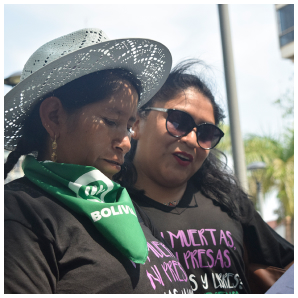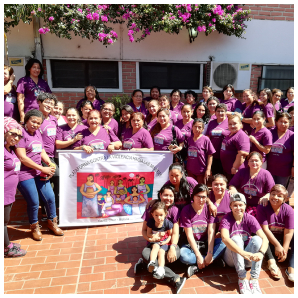We are a political commitment of popular and intersectional feminisms since 1995 that contribute with full autonomy and freedom of decision over our bodies and our lives.
Communication, participatory research, strengthening leadership and forming alliances strengthen our practice through the following approaches:


We deconstruct dominant thoughts, practices and policies of control over women in their diversity

The effects are devastating on everyone, especially on women because the care work falls on them

We respect individual freedom, autonomy, sovereignty of bodies, minds and territories

Accounts are presented clearly and meticulously. Challenges are assumed with absolute responsibility and results are communicated with opportunity and relevance.

We interact with organizations and people in their social, ethnic/cultural, generational, sexual diversity, from respect, listening and dialogue under conditions of equality.
Teresa Alarcón Rodriguez
Guadalupe Pérez Cabrera
Viviana Rodríguez Barrancos
Sinthia Suárez
Moira Rimassa Paz
Consuelo Camacho Vedia
Lorena Vaca Franco
Katerine Alejandro
Denilson Montaño Segovia
Libert Borys Romero
As a political commitment that seeks dignified and happy lives for all people, Colectivo Rebeldía was founded in March 1995 by María Cecilia Moreno V., Madela Sainz Meschwitz, Maria Eugenia Canedo U. and Mery Camargo. We were also accompanied by Janny van Esch, from Hivos Netherlands, and Ana Rochkowski, member of the Dutch Embassy in Bolivia, who were immediately interested in our proposal. Four years later, and in order to strengthen us, Diakonia would join.
In our first years, democratizing knowledge among women’s organizations was one of the first tasks.
The foundations of our work are communication, participatory research, strengthening leadership and forming alliances, which allows us to add, raise and strengthen diverse visions and voices as a practice of intergenerational and intercultural recognition.
Subsequently, our work transcended the peri-urban area to the indigenous territories and people in the department of Santa Cruz, always in alliance with women’s organizations.
Today we are a reference for popular and intersectional feminisms with solid national, regional and global alliances.
© 2024 Colectivo Rebeldía